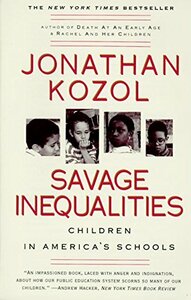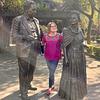Take a photo of a barcode or cover
informative
slow-paced
moving, disturbing, relevant even 30 years later. paints a picture of visceral inequalities in schools and the children who inhabit them across six cities, and presents an argument for a restructuring school funding
Saddening how true much of Kozol's arguments ring so many years later. Wish he would offer more comprehensive and tangible solutions besides re structure funding and desegregate schools.
This is one of the most compelling books I've ever read. Written in 1991, it is Kozol's account of the state of inner-city public schools at the time, and sadly, I believe the analysis to be practically unchanged in the intervening twenty years. It was especially meaningful for me as I try to move to a job in charter school management, both reinforcing the importance of the work and complicating my view of the problem and its solution.
Kozol does not pull any punches, and at times this book was quite difficult to read, outlining in excrutiating detail the awful state of many inner city public schools. He also has a unique style of writing, which seamlessly blends a clear sense of righteous anger and indignation with well-structured logical arguments. His critique of the status quo of public school funding mechanisms is very convincing.
At the same time, as I mentioned, the book complicated my picture of the no-excuses urban charter school movement that I am hoping to join. Kozol is very critical of the de facto racial segregation in the school system, which is a betrayal of Brown v. Board of Education, and as good as many charter schools are, part of their M.O. is intentionally drawing an all-minority (or nearly so) student body. There is no clear right answer to this question. Another major issue is, now that charter schools are clearly established, what is the next move in the game? Through Kozol's lens I would say the ultimate goal would be to reform the public school system using lessons learned from charter schools. This is an immense undertaking and I think there are still not many people who are really thinking in those terms.
Kozol does not pull any punches, and at times this book was quite difficult to read, outlining in excrutiating detail the awful state of many inner city public schools. He also has a unique style of writing, which seamlessly blends a clear sense of righteous anger and indignation with well-structured logical arguments. His critique of the status quo of public school funding mechanisms is very convincing.
At the same time, as I mentioned, the book complicated my picture of the no-excuses urban charter school movement that I am hoping to join. Kozol is very critical of the de facto racial segregation in the school system, which is a betrayal of Brown v. Board of Education, and as good as many charter schools are, part of their M.O. is intentionally drawing an all-minority (or nearly so) student body. There is no clear right answer to this question. Another major issue is, now that charter schools are clearly established, what is the next move in the game? Through Kozol's lens I would say the ultimate goal would be to reform the public school system using lessons learned from charter schools. This is an immense undertaking and I think there are still not many people who are really thinking in those terms.
A seminal book from my college years.
I know it’s a crazy idea, but…what if we properly funded public education?
I do remember the realization that rural schools are often almost as underfunded as inner city schools. While reading this book, I thought on more than one occasion, “Oh. You mean not all schools are like this?”
Props to my Chester County schools for really making the most of what they had.
I know it’s a crazy idea, but…what if we properly funded public education?
I do remember the realization that rural schools are often almost as underfunded as inner city schools. While reading this book, I thought on more than one occasion, “Oh. You mean not all schools are like this?”
Props to my Chester County schools for really making the most of what they had.
I was talking to the friend who recommended this book to me about inequality, and I was like, "AH, I live on the Grosse Pointe / Detroit border. If you want to study inequality, come here."
And sure enough, my hometown was mentioned in this book.
And sure enough, my hometown was mentioned in this book.
This book is clearly well researched and written. It is also immensely depressing. While reading this book, my emotional state can only be compared to the feeling of an unrelenting and exhaustive dead weight sitting upon my chest. In regards to the calculated institutional injustices facing our countries poorest students, I am firmly committed to expanding my awareness and knowledge. For that reason alone, I am happy to have read Savage Inequalities. However I found reading this book, in this moment in my teaching career felt unsettling in a way I can't quite describe and don't wish to feel. I am a California credentialed educator and have taught exclusively in Title 1 School for the past nine years. As a teacher, I must be intentional of the public education media and literature I consume. This book, for me, lacked the hope and vision personally needed to effectively remain in the profession. All of my feelings aside, I can not dispute the glaring significance of Kozol's case studies and research. Nor can I ignore the haunting realities of the public education system in our country. I believe that members of the American public who have not stepped foot into a public school classroom since graduating high school should read this book. I believe that American citizens who were afforded an affluent educational experience should read this book. I believe that public servants, elected to ensure the protection of liberty and justice for all, should read this book. There clearly is still much work to be done.
challenging
informative
slow-paced




